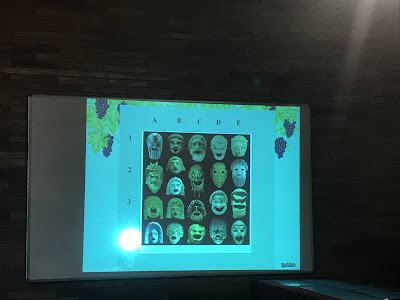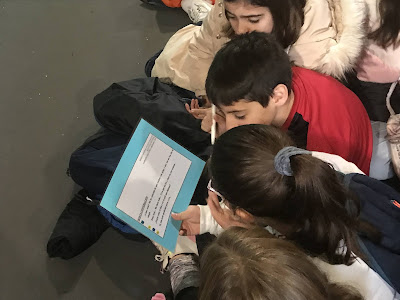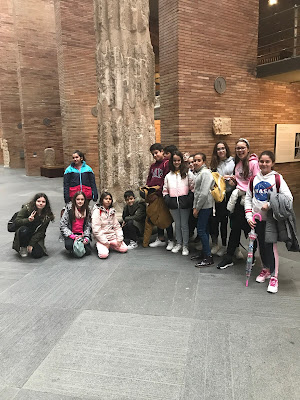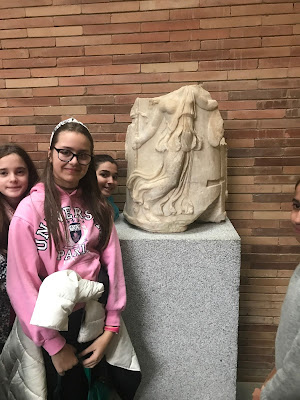TECHNOLOGIES, CULTURE AND ART
29.01.2020
Our 6th grade students visited the National Museum of Roman Art in Merida. The visit focused on Dionysus, God of fertility and wine.

6º B students with our Physical Education teacher Ángel Tato Bermejo.
This workshop was significant for our project because it related Greek mythology with the importance of the senses from antiquity to our times with the important presence of technologies.

Mosaic with Bacchic scene. It narrates the story between Bacchus and Ariadne in the Island of Naxos. Signed by the workshop that made it: EX OFFICINA ANNIBONI (End of the 4th century AD).
Charo and Guadalupe (volunteers from the Museum) were the monitors who gave the workshop. They explained to us that Dionysus means born twice, also known as the God of second chances. If we make a mistake, it indicates that we have the opportunity to change.

Charo and Guadalupe teaching the workshop.
Dionysus is raised in a paradise full of flowers and when he turns 15 he is named God of Wine.

Slide where she explains the origin of the God Dionysus.
Dionysus is also considered the God of the theater. They explained to us that in ancient times actors were called masks and in their representations they went out with the masks to represent different characters. In order to understand this concept, the monitors carried out a dynamic where our students learned that the "emojis" that we use nowadays in our communications are an evolution of the masks of the antiquity. To do this, students had to relate Roman emoticons with the current ones.

Slide with Roman emoticons

Slide with current emoticons.
The second activity was done in small groups. They were given a poster board containing examples of WhatsApp conversations. The students had to identify each of the dialogues with an "emoji mask".

One of the groups of students is preparing the Role Play.

Cards with the dialogues and solutions given by the students.

Students with their masks at the end of each of the dialogues
Students representing one of the dialogues. Link.
The third and last activity was held in the classroom and consisted of group reflection on the importance of the senses throughout history: Are they more important then or now? The activity began in the museum with the story that Charo told us about Dionysus and the 5 senses.
"Dionysus invites the 5 senses to a banquet and one of them, the ear, sits apart because he felt that everyone had a very important role in the celebration except him. Bacchus realized this and gave him a fundamental role in creating the toast. Since then there is no celebration without the sense of hearing".

Slide of Bacchus with the five senses.
Some of the group reflections:
- When some of the senses are missing, technologies are an important help and support.
- When we do not have technologies we have to sharpen the senses more.
- Technologies can help us to solve the doubts of objects that we see and do not know.
- Technologies can cause our senses to be distracted.

Claudia notes down the group's reflections.
After the activities we made a brief tour of the museum that we show you with these photographs.


Group photo - Original column of the Temple of Diana.

Entrance to the mosaic of Bacchus.

Paula, Diana and Ariadna pose next to a maenad.